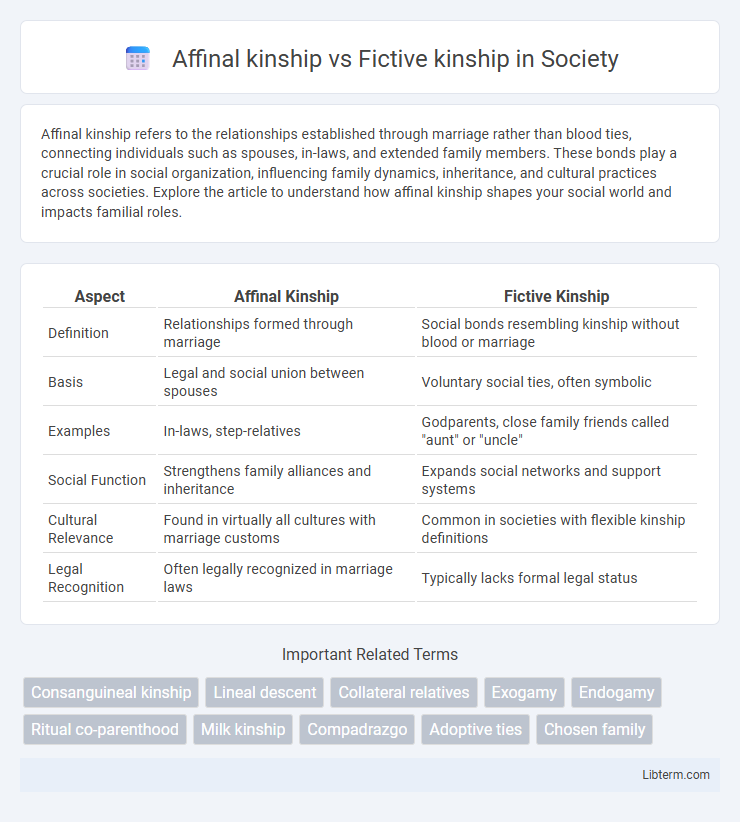Affinal kinship refers to the relationships established through marriage rather than blood ties, connecting individuals such as spouses, in-laws, and extended family members. These bonds play a crucial role in social organization, influencing family dynamics, inheritance, and cultural practices across societies. Explore the article to understand how affinal kinship shapes your social world and impacts familial roles.
Table of Comparison
| Aspect | Affinal Kinship | Fictive Kinship |
|---|---|---|
| Definition | Relationships formed through marriage | Social bonds resembling kinship without blood or marriage |
| Basis | Legal and social union between spouses | Voluntary social ties, often symbolic |
| Examples | In-laws, step-relatives | Godparents, close family friends called "aunt" or "uncle" |
| Social Function | Strengthens family alliances and inheritance | Expands social networks and support systems |
| Cultural Relevance | Found in virtually all cultures with marriage customs | Common in societies with flexible kinship definitions |
| Legal Recognition | Often legally recognized in marriage laws | Typically lacks formal legal status |
Understanding Affinal Kinship: Definition and Examples
Affinal kinship refers to relationships formed through marriage or legal unions, establishing connections between individuals who are not biologically related but linked by marital ties. Examples include the bond between a person and their spouse's parents (in-laws) or siblings-in-law, highlighting socially recognized family roles beyond blood relations. Understanding affinal kinship is crucial for studying social structures, inheritance patterns, and family dynamics in various cultures.
Fictive Kinship Explained: Meaning and Cultural Relevance
Fictive kinship refers to social ties and relationships that resemble family bonds but are not based on blood or marriage connections, such as godparents, close family friends, or clan members. This form of kinship plays a significant cultural role in many societies by providing social support, obligations, and identity beyond biological relations. Understanding fictive kinship reveals how individuals create extended social networks that strengthen community cohesion and cultural continuity.
Key Differences Between Affinal and Fictive Kinship
Affinal kinship is based on formal relationships established through marriage, such as in-laws, while fictive kinship involves social bonds that resemble family ties but are not based on blood or marriage, like godparents or close family friends. Affinal kinship carries legal and cultural obligations tied to marriage customs, whereas fictive kinship relies on voluntary, socially constructed connections without legal recognition. The key distinction lies in affinal kinship's foundation in marital alliances versus fictive kinship's creation of kin-like roles through social acceptance and emotional bonds.
Social Functions of Affinal Kinship
Affinal kinship, established through marriage ties, plays a crucial social function by creating alliances and fostering cooperation between distinct family groups. It facilitates resource exchange, mutual support, and social integration within communities, reinforcing social cohesion and stability. Unlike fictive kinship, which is based on symbolic or chosen bonds, affinal kinship is a formalized relationship recognized by legal and cultural norms.
Social Roles Shaped by Fictive Kinship
Fictive kinship shapes social roles by creating bonds that mimic family ties without biological or marital connections, often fulfilling emotional support and community obligations. These roles include godparents, close family friends, or mentors, who provide guidance, resource sharing, and social stability similar to affinal kinship. Unlike affinal kinship, which is established through marriage, fictive kinship expands social networks and reinforces social cohesion beyond traditional family structures.
Cultural Importance of Marriage-Based Ties
Affinal kinship refers to relationships established through marriage, playing a crucial role in forming alliances, social cohesion, and inheritance rights within cultures worldwide. Fictive kinship involves socially recognized bonds resembling family ties without biological or marital connections, often used to create support networks in communities lacking formal family structures. Marriage-based ties in affinal kinship maintain cultural traditions and reinforce social hierarchies, contrasting with the flexible, adaptive nature of fictive kinship in addressing social needs beyond biological or marital linkages.
Fictive Kinship in Modern Societies
Fictive kinship in modern societies refers to social bonds that mimic family relationships despite the absence of blood or marital ties, often emerging in diverse urban communities and digital networks to provide emotional support and social cohesion. Unlike affinal kinship, which is legally recognized through marriage, fictive kinship is culturally constructed and flexible, encompassing godparents, close friends, or community members who fulfill familial roles. This form of kinship plays a critical role in multicultural settings, refugee integration, and chosen families among LGBTQ+ groups, emphasizing social solidarity over biological or legal connections.
Cross-Cultural Perspectives on Non-Blood Relations
Affinal kinship refers to relationships established through marriage, such as in-laws, which carry recognized social and legal obligations across various cultures. Fictive kinship, however, encompasses non-blood ties created through social agreements, rituals, or mutual support systems, often found in societies where communal bonding extends beyond biological or marital ties. Cross-cultural perspectives reveal that both affinal and fictive kinship play crucial roles in social organization, with examples like godparenthood in Latin America and clan marriage alliances in African communities illustrating diverse non-blood relational frameworks.
Kinship Networks: Navigating Affinal and Fictive Bonds
Kinship networks encompass both affinal and fictive kinship, where affinal kinship arises through marriage connections, creating formalized familial ties between in-laws. Fictive kinship extends beyond biological or marital relationships, forming socially recognized bonds often akin to family, such as godparents or close family friends. Navigating these networks requires understanding the social roles and obligations embedded in affinal ties and the symbolic significance of fictive relations within communities.
Impact of Affinal and Fictive Kinship on Social Structure
Affinal kinship, established through marriage ties, plays a crucial role in expanding social networks and forging alliances between families, thereby reinforcing social cohesion and hierarchy. Fictive kinship, based on socially recognized bonds not derived from blood or marriage, enhances community solidarity by creating inclusive support systems and facilitating resource sharing. Both kinship forms significantly impact social structure by shaping interpersonal relationships, influencing social obligations, and maintaining group stability.
Affinal kinship Infographic

 libterm.com
libterm.com